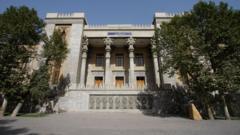Khamenei warns that US demands are excessive and reiterates Iran's commitment to maintaining its enrichment capabilities.
Khamenei Skeptical About Progress in US Nuclear Discussions

Khamenei Skeptical About Progress in US Nuclear Discussions
Iran's Supreme Leader voices doubts on potential breakthroughs in ongoing negotiations with the US regarding nuclear activities.
Iran's Supreme Leader, Ayatollah Ali Khamenei, has cast a shadow of doubt over the prospects of achieving a new agreement in the ongoing nuclear discussions with the United States, asserting that the US has made “excessive and outrageous” demands regarding uranium enrichment. Khamenei articulated skepticism about the talks leading to a positive outcome, indicating, “We don't think it will lead to any outcome. We don't know what will happen.”
Despite earlier comments from US President Donald Trump indicating that Iran had “sort of” agreed to a deal following four rounds of mediation by Oman, Tehran's chief negotiator rebuffed the idea that Iran would halt its production of enriched uranium. This uranium can be utilized for both reactor fuel and the creation of nuclear weapons. Trump has warned that failure in the negotiations could lead to military action from the US and Israel against Iran.
Iran maintains that its nuclear program is solely for peaceful purposes, asserting it will not pursue nuclear weapons. Nevertheless, in response to severe sanctions reimposed by the US, Iran has surpassed restrictions set forth in the previous nuclear deal, stockpiling sufficient highly-enriched uranium capable of producing several nuclear bombs.
Khamenei made his remarks during a ceremony honoring the late President Ebrahim Raisi, a hardliner known for his rejection of direct negotiations with the US. He commended Raisi for maintaining a firm stance against external pressures, with words of praise for rejecting enticements to negotiate with the intention of avoiding manipulation.
As he critically assessed the past negotiating efforts under Raisi’s moderate predecessor, Hassan Rouhani, Khamenei expressed a lack of optimism for progress in the current discussions led by the reformist Masoud Pezeshkian. He characterized the American side’s approach during negotiations as flawed, particularly their statement regarding limiting Iran’s enrichment capabilities, calling it a fundamental miscalculation: "No-one waits for their permission."
US special envoy Steve Witkoff emphasized in a recent interview that allowing any uranium enrichment by Iran is unacceptable, underscoring the seriousness of the situation. He remarked, "We cannot allow even 1% of an enrichment capability," explaining that any deal must include restrictions on enrichment to prevent weaponization.
In a rebuttal, Iranian Foreign Minister Abbas Araqchi expressed that Witkoff's expectations are unrealistic and detached from the current negotiation reality, affirming that Iran's enrichment activities are non-negotiable.
The 2015 nuclear deal, which interconnected Iran with then-President Barack Obama and several other global powers, required Iran to limit its nuclear activities in exchange for relief from sanctions. Iran's current stockpile of uranium enriched to 60% purity is alarming for the global community, as it approaches weapons-grade levels and could theoretically be enriched further to create multiple nuclear warheads.
Despite earlier comments from US President Donald Trump indicating that Iran had “sort of” agreed to a deal following four rounds of mediation by Oman, Tehran's chief negotiator rebuffed the idea that Iran would halt its production of enriched uranium. This uranium can be utilized for both reactor fuel and the creation of nuclear weapons. Trump has warned that failure in the negotiations could lead to military action from the US and Israel against Iran.
Iran maintains that its nuclear program is solely for peaceful purposes, asserting it will not pursue nuclear weapons. Nevertheless, in response to severe sanctions reimposed by the US, Iran has surpassed restrictions set forth in the previous nuclear deal, stockpiling sufficient highly-enriched uranium capable of producing several nuclear bombs.
Khamenei made his remarks during a ceremony honoring the late President Ebrahim Raisi, a hardliner known for his rejection of direct negotiations with the US. He commended Raisi for maintaining a firm stance against external pressures, with words of praise for rejecting enticements to negotiate with the intention of avoiding manipulation.
As he critically assessed the past negotiating efforts under Raisi’s moderate predecessor, Hassan Rouhani, Khamenei expressed a lack of optimism for progress in the current discussions led by the reformist Masoud Pezeshkian. He characterized the American side’s approach during negotiations as flawed, particularly their statement regarding limiting Iran’s enrichment capabilities, calling it a fundamental miscalculation: "No-one waits for their permission."
US special envoy Steve Witkoff emphasized in a recent interview that allowing any uranium enrichment by Iran is unacceptable, underscoring the seriousness of the situation. He remarked, "We cannot allow even 1% of an enrichment capability," explaining that any deal must include restrictions on enrichment to prevent weaponization.
In a rebuttal, Iranian Foreign Minister Abbas Araqchi expressed that Witkoff's expectations are unrealistic and detached from the current negotiation reality, affirming that Iran's enrichment activities are non-negotiable.
The 2015 nuclear deal, which interconnected Iran with then-President Barack Obama and several other global powers, required Iran to limit its nuclear activities in exchange for relief from sanctions. Iran's current stockpile of uranium enriched to 60% purity is alarming for the global community, as it approaches weapons-grade levels and could theoretically be enriched further to create multiple nuclear warheads.




















